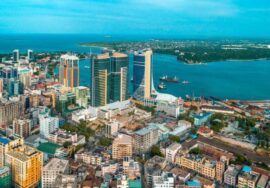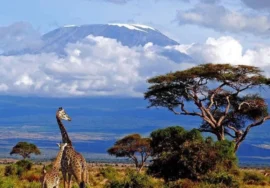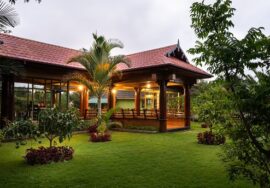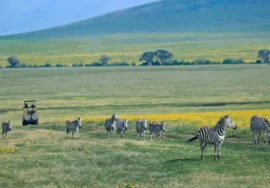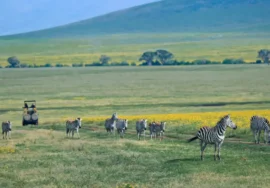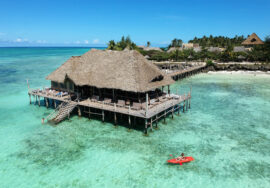
Tanzania Safaris Packages Pre-Departure information
Tanzania Safaris Packages Pre-Departure Information.
Pre-Departure Information: Visas
Please be aware that it is your responsibility to get the necessary visas for your trip.
These details are intended for citizens of the United States and the European Union; those of other nationalities should get in touch with the High Commission in their area. At the time of this writing, the information shown here is accurate; nevertheless, it is subject to change.
Kenya as well as Tanzania
It is possible for nationals of the European Union and the United States to obtain visas for Tanzania and Kenya upon arrival in each country. However, your passport must be valid for at least six months after your departure from Africa and must have at least two blank pages that are unused consecutively in each country that you intend to visit.
In any case, passengers who have tight onward connections (for example, traveling between Kilimanjaro and Wilson, or connecting to the Selous or Ruaha) are strongly urged to secure their visas in advance of their departure. This is because the lines at the airport can be rather long, and the aircraft will not wait for them.
Telephone number 020 7569 1470 is the address of the Tanzania High Commission in London, which can be found at 3 Stratford Place, London, W1C 1AS. To contact the Tanzanian Embassy in the United States, please visit their website at tanzaniaembassy-us.org or call them at 202-9396125.
The Kenya High Commission in London can be reached at 040 7636 2371 and is located at 45 Portland Place, London, United Kingdom.
By visiting http://www.kenyaembassy.com/visa.html, individuals who are citizens of the United States can acquire information regarding Kenyan visas.
The United Kingdom’s Action Visas, which may be reached at 020 7939 8100, is also able to obtain visas for a cost.
Pre-Departure Information: luggage
The maximum amount of baggage that can be carried on an internal scheduled or charter aircraft flight is 15 kilograms per passenger, which includes hand luggage.Due to the stringent enforcement of these limitations, we ask that you please restrict the weight of your luggage to the proper amount.
It is also requested that you bring your luggage in soft-sided bags that do not have wheels or handles that are hard, such as kit bags or other similar bags, rather than in rigid suitcases. It is important to keep in mind that foreign airlines frequently misplace or lose hold luggage. As a result, we strongly recommend that you bring any critical goods (such as a change of clothes, malaria tablets, prescriptions, and so on) with you in your carry-on luggage.
Pre-Departure Information: Packing List
You don’t have to bring too many clothes with you because all safari hotels and camps offer a laundry service that is usually free. Most of the time, underwear is not allowed. However, your room or tent will usually have washing powder available. Keep in mind that this is the African bush, so the service will be pretty basic. Your things won’t be nicely ironed or wrapped in tissue paper, so don’t send anything too fragile!
On safari, you should wear clothes that are casual and easy. Because of the high altitude, the Ngorongoro Crater and Ruaha are often cold in the early morning and late evening. The days are usually hot. You should wear a few light clothes along with a warm fleece and jacket so that you can adapt to the weather as the day goes on. Bugs and the sun can both hurt you, so long-sleeved shirts can also help. Neutral colors like khaki, green, and beige are best.
Not white (it won’t stay white for long!) or camouflage, which is linked with the military and could accidentally make someone feel bad. Most hotels don’t have strict dress codes, and you don’t have to change for dinner. However, some people like to get a little more fresh after an evening game drive. In Baraza on Zanzibar, the only place that doesn’t follow this rule, guys must wear long pants to dinner.
WHAT TO WEAR: – Shorts – T-shirts – Long pants – Long-sleeved shirts – Sweater or fleece – Warm jacket – Light raincoat Socks and underwear Wear pajamas, a swimsuit, and sturdy, comfortable shoes for walks. Sandals or flip-flops to wear around camp. Gloves for cold mornings. Thick gardening gloves for gorilla climbing (to hold on to sharp plants). Glasses for sun Hat with a wide brim Things that get wet or dirty can be put in waterproof bags. A blanket, sarong, or kikoy is often very helpful.
The Safari Store has great clothes and gear for safaris, and we’re happy to suggest them. When our clients use the code adventure at checkout, they get a 10% discount.
TOILETRIES: sunblock, bug spray, Lip balm · Antihistamine cream for stings and bug bites First-aid kit with rehydration pills and Imodium Body Parts Malaria pills (for the most up-to-date information, talk to your doctor before you go) Take motion sickness pills if you need to. Personal hygiene products and medicine
General: binoculars; camera with lenses, filters, batteries, charger; memory cards (these are hard to find in East Africa, so bring more than you think you’ll need). People who like to take pictures should have a zoom lens with at least 300mm.
– Batteries and chargers for electronics – A travel switch for people who aren’t from the UK (Tanzania uses 3 pin plugs) – A flashlight – Local guidebooks and guides to wildlife and birds Credit cards and ATM cards (make sure your bank has foreign ATMs to avoid high fees and let them know where you’ll be going before you leave) € Cash (US dollars) for camps that don’t take credit cards and some small bills for tips
Mobile phone or cellphone and charger
WHAT YOU NEED: · Your passport and copies of it · Your plane tickets and vouchers · Your itinerary and travel/accommodation vouchers · Proof that you have travel insurance Yellow Fever Inoculation document—if you are going to Zambia or East Africa, you need to be vaccinated against yellow fever at least 10 days before your trip. You will also need a certificate or card as proof when you enter the country.
Pre-Departure Information: Tipping
A driver or guide on safari should be tipped US$15 per guest per day. You should also leave a general tip of $10 per guest per day at bush lodges or camps and $5 per guest per day at beach hotels or resorts. This should be split between the general staff.
Pre-Departure Information: Insurance
All of our travelers must have full travel insurance that covers emergency repatriation. This is a requirement of booking with us. We can’t sell insurance or suggest a company, You should look around to find the policy that best fits your needs. There are, of course, many other great insurance companies out there.
People from the UK who want to travel and need protection to cover FCDO advisory locations should think about Battle Face protection.
Pre-Departure Information: Healthy
YELLOW FEVER
People coming into Tanzania, Kenya, or Mozambique from any Yellow Fever-infected country (like Kenya, Tanzania, Ethiopia, Uganda, etc.) must have a valid Yellow Fever certificate with them. You will be asked to show this certificate when you arrive, even if you were only passing through an infected country’s airport. If you do not have the right license, you might not be able to get in.
If you are coming from Europe or the US, or if you are going from mainland Tanzania to Zanzibar, you DO NOT need a Yellow Fever certificate.
But because these rules could change overnight and because overzealous customs officials could get them wrong, you should definitely bring a Yellow Fever certificate or an exemption certificate with you when you travel. Also, keep in mind that the Yellow Fever vaccine doesn’t start working until 10 days after it is given.
MALARIA
East Africa is full of people who have malaria. Talk to your doctor before you go on vacation to find out what precautions are currently suggested. Get medical help right away if you feel sick and have a fever while you are traveling or within a year of coming back from a trip. Tell your doctor that you were in a malarial zone.
STOMACH UPSETS
It’s normal to have a slight stomachache or two in the beginning of your trip because the food and water are different. You might want to bring some Imodium and rehydration salts with you just in case.
OTHER
Most of the time, people who are going to East Africa should get typhoid and hepatitis shots. Talk to your doctor about these and any other suggested shots before you go on vacation.
PERSONAL DRUG USE
It is important to make sure you bring enough of any personal medicines to last the whole trip. It is also a good idea to bring a copy of your medication with you in case there are any problems at customs. In case your checked luggage gets lost, it’s best to keep your important medicines in your carry-on luggage.
Pre-Departure Information: Photography and Electricity
We suggest a 70-300mm lens for serious photographers who want a zoom of at least 300mm. Another useful thing to bring on vacation is a pair of binoculars. For birdwatchers, 10×40 is the best size. The Safari Store lets you rent a pair.
The mains power has 240 volts and 50 cycles, and the plugs are UK-style. During a safari, a lot of lodges and tented camps have their own generators that provide patchy power. You should not be upset when the power goes out for short periods of time; instead, you should see this as part of the fun of going on safari. You should bring a small lamp. In all of the camps, you can charge your cameras, phones, and tablets at some time.
Some camps and hotels don’t let people use hair dryers that need extra power.
Pre-Departure Information: Internal Flights
Please keep in mind that ALL flights within Africa will stop at at least one different airstrip on their way to their end destination. The airlines choose the exact route the night before.
Pre-Departure Information: Language
Most Tanzanians speak Swahili as their first language, but English is also widely spoken and is the national language of Tanzania. People who come to the country don’t have to speak Swahili, but if you try to say a few words in the language, people will be very happy.
Wow! Good morning, Harari! Greetings and how are you today?
No problem, mchana Greetings and how are you today?
No problem, jioni Hello (or late afternoon) and good evening. How are you this evening? Please forgive me! Excellent!
What about us? Who are you?
Ahvaz Tafadhali Thanks in advance. Mahalo, Karibu Many thanks, or “Asante sana.”
Iyoho Hapana: Yes
Kizuri or Chakula delicious food
Lala, hello! Enjoy your sleep.
Elephant: Tembo; Crocodile: Mamba; Giraffe: Tiwi; Impala: Swala;
Pre-Departure Information: Currency
Tanzania’s money is called the Tanzania Shilling. Shillings are used in some places, but not everywhere. All of your prices and payments will be in dollars, so you don’t need to bring them. Please be aware that US dollar bills from before 2006 are not usually accepted because they could be fakes.
Many places take credit cards, but there is usually a big fee added on top of the amount you pay. You will need to pay for your drinks in cash at some camps because they don’t take cards. Additionally, you might want to bring enough small bills in US dollars for tips.
Pre-Departure Information: Culture
It is important to accept everyone’s culture, even though most people in Tanzania are Christians. A lot of the coast is Muslim. The only places you should wear swimwear are at the beach and at the pool at your hotel or camp. No tops are allowed when sunbathing. Anywhere in the country, you should ask permission before taking pictures of people. Most safari hotels have a laundry service, but underwear isn’t always included.
Pre-Departure Information: Airport Tax
There is a departure tax on flights leaving Zanzibar. It is $46 per person for foreign flights and about $15 per person for domestic flights. An exit tax of $40 is charged for flights leaving Kigali. You have to pay these amounts in cash in the area. In Tanzania, all other taxes have already been paid.

